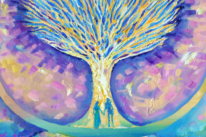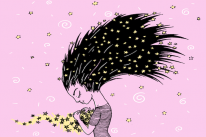
“To be fully alive, fully human, and completely awake is to be continually thrown out of the nest.” ~Pema Chodron
Last year I decided to do something I’d always longed to do but had never been brave enough to take the plunge: I started my own business. Not only was it a new venture, my business would be based around myself—my skills, knowledge, and experiences.
Holy crap.
My emotions swung from terrified to awkward and uncomfortable. Seriously, that’s how good it got, at least initially! It’s been exciting and exhilarating, but not in the least bit comfortable.
Here I was, standing for the entire world to see as a self-proclaimed “person who knows quite a lot about some stuff.” I may as well of had my subconscious make me a T-shirt that read “Who the hell do you think you are?”
Revealing things about myself was not comfortable at all. Opening up about my years living with depression—an illness whose superpower is convincing its host that they are worthless and weak—left me feeling vulnerable and exposed.
To acknowledge my depression, and put myself out there as someone who knew quite a lot about a certain subject, was nothing short of excruciating at times.
But I had my secret weapon. Over the years I’ve gathered a group of people who “get” me. People who love and approve of me and what I do. I’ve always felt like this tribe insulated me from the feelings of exposure and judgment I might get from other people.
One person in particular, who’s been my teacher on one of my courses, is someone I particularly admire. I basked in the warm glow of his encouragement and positive feedback; I felt approved of, nurtured, and safe around him.
Because learning is something I hold dear (and I was utterly clueless about it) when I started my business, I decided to take some courses in marketing and business building. This seemed a better strategy than stumbling my way through blindly, so I hovered up new information like I was starved of it.
I started implementing. I made gazillion mistakes but I kept going. I kept remembering the phrase “There’s no failure, only feedback”—and I was getting a hell of a lot of feedback!
But I learned that I was much more tenacious than I’d first thought. There were lots of challenges, but I overcame or circumnavigated them. I kept moving forward. I felt a teeny bit proud of myself.
I gradually became more courageous and shared more of the real me with readers and workshop participants. I became less of the safe, corporate “me” and more of the real, flawed, goofy, “me”—complete with opinions, imperfections, and history.
I told my story of experiencing depression for years and rather than being lambasted for it, the connections I made with my students and readers were profound and rewarding. No one told me they thought less of me for it; if anything, they thought I was brave.
Work started to come in—a trickle, but definitely a move in the right direction. As I took my wobbly steps one after the other, I started to feel stronger and more confident. My tribe was great—super supportive and really encouraging. It felt good.
Apart from one thing.
The teacher I admired so much didn’t seem approving. In fact, he seemed critical and dismissive of what I was doing.
And I felt crushed.
When we’re trying something new we can feel fragile, and any little thing can dent our confidence and break our resolve. It’s even more acute when we’re putting ourselves out there, whether that is through our creative work or our personal stories.
When someone doesn’t approve of our work, it’s like they don’t approve of us. And this is painful—especially when the person in question is someone we admire and crave approval from.
I so wanted him to get it—to support and champion what I was doing. But he didn’t. He wasn’t nasty or cruel; he’s a kind and warm person and that would be totally out of character for him.
But his response was somehow harder to deal with. He was dismissive and uninterested.
I bundled up my courage and asked him if something was wrong.
“No,” came the reply, complete with furrowed brow and an edge of confusion in his voice. “I don’t really get what you’re doing. For me, it doesn’t work.”
Because all of this self-growth stuff is a journey without a destination (the journey is the destination) I know that I would have responded in different ways at different times in this journey. Here are some past options:
1. Stop completely. This feels too hard/scary and unsafe. I am obviously not good enough and certainly not strong enough to carry on.
2. Stop, retreat, and go back to my original, “safe” world. Try and replicate whatever advice my teacher gives me, encompassing his philosophy, beliefs, and experience. I disappear but at least I don’t risk feeling unlovable.
3. Rationalize his behavior; put it down to envy at my emerging success, or insecurity on his part for moving on from his teachings. I mean what’s his problem?
4. Carry on, feeling the pain but moving through it anyway.
To be honest, all of these were tempting. Having an excuse not to be “out there” feeling exposed and vulnerable was very enticing. I could go back to being safe, anonymous, and totally invisible.
Even though it would be like silently dying inside everyday.
So that wouldn’t really be a viable option then! I needed to do something different. I needed a shift of perspective. My teacher isn’t a cruel or vicious man, and his comments weren’t meant to wound me. So why was I hurt that what I was doing didn’t work for him?
That was it; that was the shift I needed. What I was doing didn’t work for him. Instead of beating myself up and falling into a pit of “what’s wrong with me?” I realized it wasn’t about me at all.
I’m a keen cake baker, and if I make a carrot cake (one of my favorites) I don’t get offended if someone says “Oh, thanks but I don’t really like carrot cake.”
I know that this situation is different from a cake, but the analogy still holds. My teacher wasn’t saying, “I don’t like you.” He was saying that what I was writing about and publishing as part of my business didn’t work for him.
So this was the response I chose instead:
Realize that we’re on different paths. I don’t need him to approve of and like 100% of what I do. I know he respects me; it’s just not his thing. It’s my thing.
It’s carrot cake. And there are plenty of other people out there who really like carrot cake.
I don’t need everyone to appreciate the same things as me. My sense of self isn’t entirely dependent on what other people think. Hell, I’m still human; of course it still feels great when other people affirm me, but I don’t need it to still be okay with myself.
Inside the nest feels safe and warm.
But outside of the nest is where we learn to fly—feeling scared, but awake, alive, and fully human.
Photo by Anurag
About Jo Casey
Jo Casey is a resilience expert, trainer and coach who’s on a mission to help people increase their joy, passion & impact at work. She’s a mama, recovering perfectionist, yoga addict and baker of a mean sponge cake. Visit Jo at www.jocasey.com where you can sign up for her free ‘Work Happier Now’ course. Or you can follow her on Facebook and Twitter.













 Though I run this site, it is not mine. It's ours. It's not about me. It's about us. Your stories and your wisdom are just as meaningful as mine.
Though I run this site, it is not mine. It's ours. It's not about me. It's about us. Your stories and your wisdom are just as meaningful as mine.
Challenge your comfort zone and face your fear. Thanks for sharing.
You’re welcome Braja – I’m glad you enjoyed it
I really liked this. Thank you for sharing. I’m always challenging my comfort zone and wonder if I’m crazy for doing so when i’m terrified for doing it. Lately I’ve been tired of being “out there” but your post helped to inspire me to keep going.
I’m glad it helped Carrie – I know that ‘am I crazy for doing this?’ feeling well – someone once said to me that the key to success is becoming comfortable with discomfort – I think they might be onto something there!
I love carrot cake and I loved reading your post. I just went through a similar thing, but it was my wife who didn’t want me to follow through on a new job that would mean relocating but with less pay. I understand her point of view and will keep looking for a solution where we are both happy. But if it were my teacher, I’d just have to say, “oh well,” and move on with my life. I’m a teacher too, and I think he should have been a little more supportive, even if he didn’t like what you were doing. Why squash someone else’s dreams?
You sound like a great teacher Tim – thanks for the kind words and I’m so glad you enjoyed the post.
What a lovely post ! I just recently wrote about getting out of our comfort zone as well and fear was exactly one of the things we are supposed to overcome in order to get to know ourselves better and also grow within the experience.
People who do face their fears and poke the barriers of their comforts do tend to be more successful 🙂
Thank you Jo for sharing.
You’re very welcome. Fear is an inevitable part of living life – we either have to face it or we run from it. Facing it isn’t always easy but it’s the only way to truly live. Thank you for such a kind comment.
Thank you for sharing a new way of thinking about interpersonal interactions. Your perspective has helped to shift mine in a positive way.
That’s great Kakelina
Thanks for sharing this piece Jo. I honestly am going though a very similar situation right now. When people comment on your work, it is hard not to take it personal. But like you said, it’s more a matter of personal preference than any personal attachment the person is making. They aren’t saying I don’t like you, or approve of you, just that it isn’t really the way they do it. I heard a saying I can’t remember where, “just because someone isn’t walking the same road as you doesn’t mean they are lost. ”
Dave @personalgrowthproject
I’m a recovering perfectionist too! Just started my journey to try and de-perfectionize my life. I quit my soul-sucking job and also hope to open my own business one day in the not-too-distant future. Thanks for an excellent post.
Jo- Great post about overcoming fear and everything that it conjures up. I love your use of humor throughout- especially the t-shirt image and the superpowers of depression. Many can certainly relate to everything here. Thanks for making the way just a little easier for the rest of us.
thanks for the great post, very inspiring. I am currently thinking of a new career path that fulfils who i am, I love that I have found this amazing resource I have spent many years avoiding life with antidepressants. now i feel it is time to engage with life with the help of mindfulness and with the help of the inspiration you and others are giving me